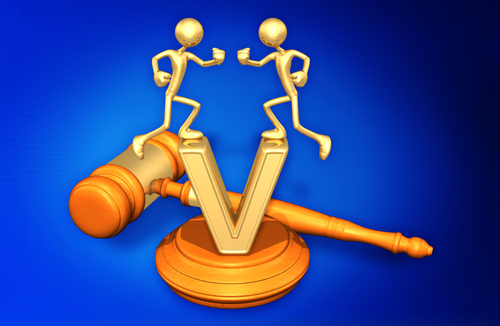Lawyer v. Attorney: Are all titles created equal?

"Tomayto," "tomahto"—what’s in a name? In the legal field, the distinction between an attorney and a lawyer could be a big deal, despite the fact that few attorneys or lawyers even know the difference. (Image from Shutterstock)
“Tomayto,” “tomahto”—what’s in a name? In the legal field, the distinction between an attorney and a lawyer could be a big deal, despite the fact that few attorneys or lawyers even know the difference.
Stuart Teicher, an attorney or a lawyer (“Now, I don’t know,” he jokes), is an adjunct professor at the Georgetown University Law Center. He says he thought that the terms were interchangeable.
“Whatever pops out of my mouth is what I say,” Teicher says. “Sometimes if I want to sound like a big shot, I’ll say ‘attorney.’ It sounds fancy.”
It may sound fancy, but it’s also a legal term.
Technically, all attorneys are lawyers, but not all lawyers are attorneys, explains Matheu Nunn, a partner with Einhorn, Barbarito, Frost, Botwinick, Nunn & Musmanno in Denville, New Jersey. An attorney is someone who passed the bar examination and has been admitted to practice law in a jurisdiction. But a lawyer, who may have received the same legal training as an attorney, has not been admitted to practice law.
“Both may provide legal guidance, but only the attorney can appear in court, whereas a lawyer can provide advice as a consultant or an adviser, in which the advice is based on their training and education,” Nunn says.
Lawyers’ duties are primarily to the legal system or to a tribunal, such as duty of candor and the duty of competence. So a lawyer might possess and utilize legal knowledge without representing a client, says Natalia Polukhtin, the founding attorney of Global Practice in Scottsdale, Arizona, and the vice chair of the National Ethics Committee for the American Immigration Lawyers Association.
Once lawyers pass the bar and become licensed, they can act on behalf of others in a legal capacity, and they are referred to as attorneys, says Oliver Morrisey, the owner of Empower Wills and Estate Lawyers in Sydney.
The difference derives from historical English common law in which legal professionals had very distinct roles, Morrisey says. Terms such as “barrister,” “solicitor” and “attorney” were used to describe specific functions. Attorneys were appointed to act as representatives in legal matters, particularly in courtrooms.
Over time, Morrisey says, especially in the United States, these roles merged as legal systems modernized.
While these historical distinctions are less rigid today, they help explain why the terms still carry nuanced differences in specific jurisdictions.
“For instance, in some jurisdictions, a lawyer may advise on legal matters but cannot represent someone in court unless they meet specific licensing requirements,” Morrisey says. “The evolution of these roles reflects a shift toward making legal services more accessible and practical, but it is still important to understand what each title truly means.”
Still, standard English language dictionaries and Black’s Law Dictionary treat the terms as equivalents or synonymous, as do most judges, attorneys and lawyers, Nunn says.
So don’t be too shocked if you encounter a lawyer at trial or an attorney who just graduated from law school.
“Among laypeople, I think the distinction isn’t really clear, and I don’t think anyone even cares,” says Paul Koenigsberg, an attorney (yes, an attorney) with Koenigsberg & Associates in New York.
Justin Lovely, a personal injury attorney and owner of the Lovely Law Firm Injury Lawyers in Myrtle Beach, South Carolina, agrees. Today, he says, it doesn’t matter which terms you use, as both refer to trained legal professionals.
The change reflects transformation within the law, and it also mirrors how society has evolved—thinking about professionalism and education in deeper, more complex ways, he says. Back in the day, Lovely says, it was a big deal for an “attorney-at-law” (the official term) to stand in court and represent clients. The lawyers could be anyone with training.
But today, the terminology is not a big deal. And you won’t (or shouldn’t) be sued if you use the words indiscriminately.
Planning on impersonating a lawyer or an attorney without the requisite training or bar admittance? That’s a different story.



